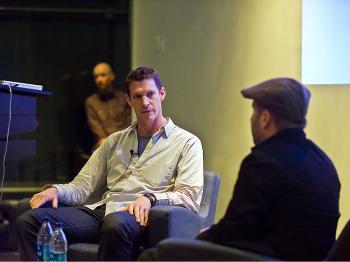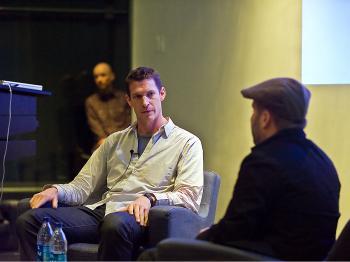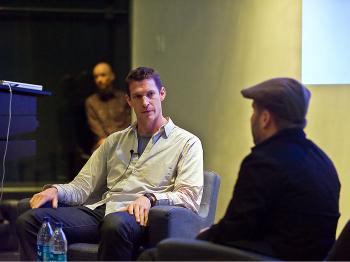Tim Hetherington is a New York City-based photographer and filmmaker, who has spent 10 years reporting on conflict, most notably in Liberia and Afghanistan. His new feature-length film, “Restrepo,” was made after 15 months of living with a platoon of U.S. Army soldiers in Afghanistan’s deadly Korengal Valley in 2007-2008. Hetherington and his Vanity Fair colleague, Sebastian Junger, captured scores of close and personal footage in the life of a soldier. The result is a sensitive, insightful, provoking, and controversial film, which took top documentary honors at the 2010 Sundance Film Festival.
In a recent interview with Tim Hetherington, he talked about why he does what he does, the making of “Restrepo,” and answered questions like, “Just how crazy are you?”
Hetherington likes to start out conversations by asking questions. Something in his character makes him naturally curious about other people, even when he’s being interviewed. Maybe that’s why when a standard Vanity Fair assignment, alongside colleague Sebastian Junger, to Afghanistan turned into a 15-month journey. He was able to become deeply familiar with the soldiers he filmed and photographed. But it didn’t start that way.
“I thought it would be a quiet assignment,” says Hetherington about his perspective at the outset. “I thought we would have a quiet time walking in the mountains and meeting with village elders and drinking tea.”
But he and Junger ended up going back to an outpost named Restrepo in an area of Afghanistan called the Korengal Valley, where he says there was “a lot of kinetic activity.” What made the story come alive were the soldiers they shadowed.
“The best stories … are a microcosm of the bigger story,” says Hetherington, adding that during his time in Afghanistan, one-fifth of all fighting in the country was taking place in the Korengal Valley.
“Once we had this amazing story in this microcosm space, I didn’t need to travel to any other place in Afghanistan,” he said. “And I was with this group of soldiers right at the tip of the spear.”
Initially, the hardest part of the job for Hetherington was gaining the trust of the soldiers and overcoming the skepticism he says journalists in the military community usually face.
“Soldiers keep to themselves—it’s kind of yes sir, no sir—it’s very simple answers,” says Hetherington, adding that his first photographs were just soldiers in uniforms, but by the end he was photographing the same men at their most vulnerable, sleeping.
“What happened was a kind of profound intimacy between us, that very intimate side of war that you don’t often see.”
In a recent interview with Tim Hetherington, he talked about why he does what he does, the making of “Restrepo,” and answered questions like, “Just how crazy are you?”
Motivation and Endurance
Hetherington likes to start out conversations by asking questions. Something in his character makes him naturally curious about other people, even when he’s being interviewed. Maybe that’s why when a standard Vanity Fair assignment, alongside colleague Sebastian Junger, to Afghanistan turned into a 15-month journey. He was able to become deeply familiar with the soldiers he filmed and photographed. But it didn’t start that way.
“I thought it would be a quiet assignment,” says Hetherington about his perspective at the outset. “I thought we would have a quiet time walking in the mountains and meeting with village elders and drinking tea.”
But he and Junger ended up going back to an outpost named Restrepo in an area of Afghanistan called the Korengal Valley, where he says there was “a lot of kinetic activity.” What made the story come alive were the soldiers they shadowed.
“The best stories … are a microcosm of the bigger story,” says Hetherington, adding that during his time in Afghanistan, one-fifth of all fighting in the country was taking place in the Korengal Valley.
“Once we had this amazing story in this microcosm space, I didn’t need to travel to any other place in Afghanistan,” he said. “And I was with this group of soldiers right at the tip of the spear.”
Getting Close
Initially, the hardest part of the job for Hetherington was gaining the trust of the soldiers and overcoming the skepticism he says journalists in the military community usually face.
“Soldiers keep to themselves—it’s kind of yes sir, no sir—it’s very simple answers,” says Hetherington, adding that his first photographs were just soldiers in uniforms, but by the end he was photographing the same men at their most vulnerable, sleeping.
“What happened was a kind of profound intimacy between us, that very intimate side of war that you don’t often see.”






